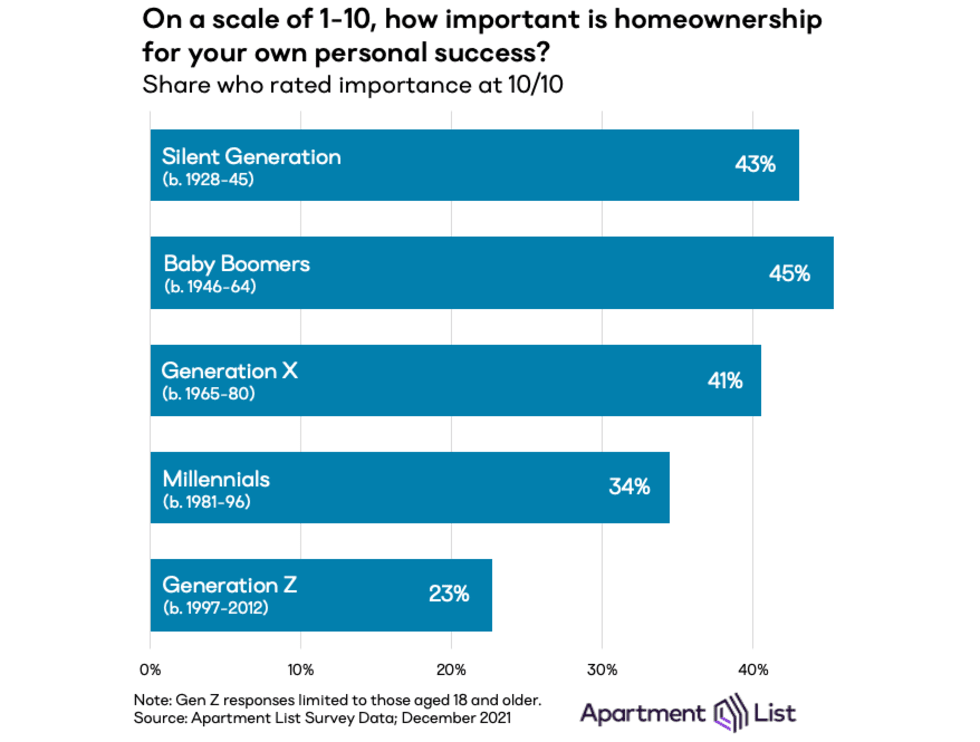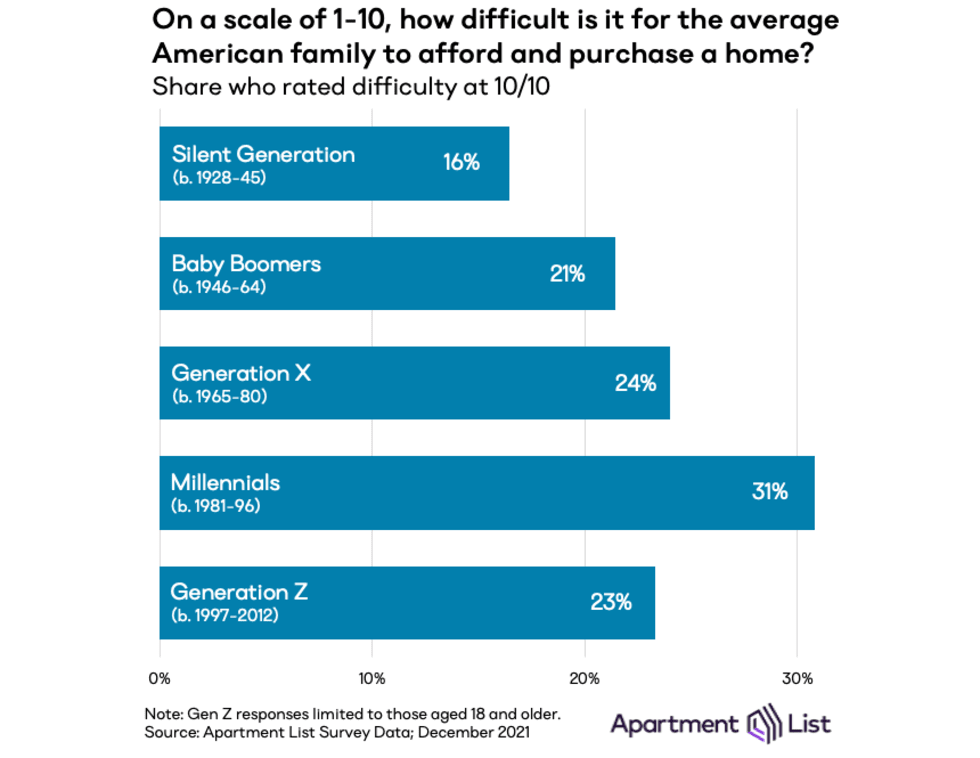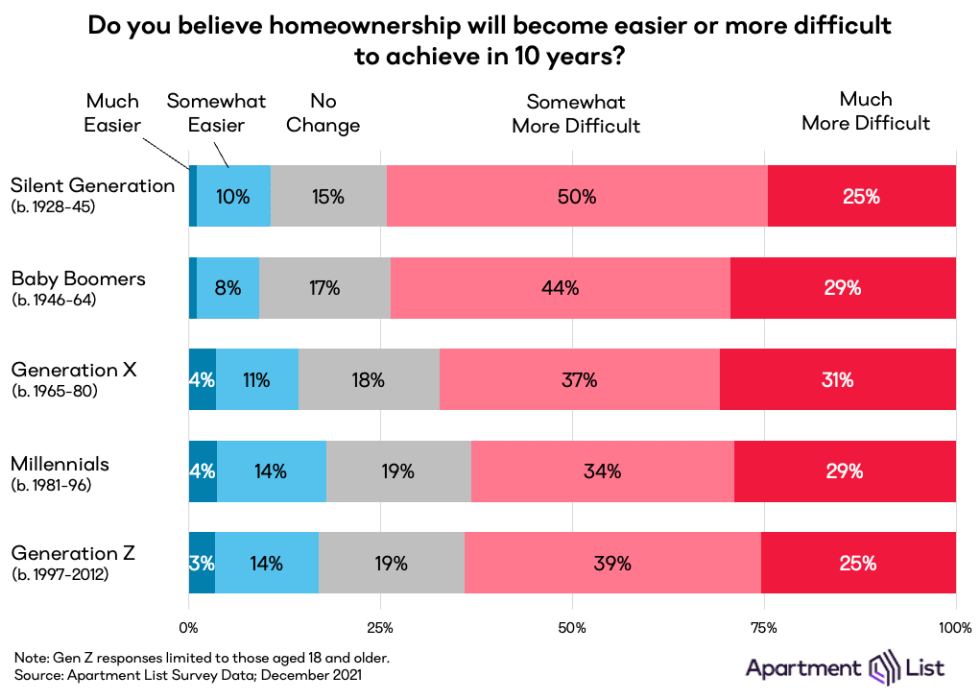Generational Attitudes on Homeownership

Introduction
Since the start of the pandemic two years ago, home prices have risen by 29 percent. With historically low levels of for-sale inventory available, prospective homebuyers are currently competing more fiercely than at any other point in recent memory. Despite these challenges, a majority of Americans still feel that homeownership is an important goal worth striving for, but these attitudes vary by generation. In our most recent survey, we find that Baby Boomers are nearly twice as likely as members of Gen Z to rate the importance of homeownership at 10 out of 10.1
We also find broad agreement that buying a home is no easy task – a majority of our survey respondents rated the difficulty of achieving homeownership at 8 or higher, with Millennials having the most pessimistic views. And unfortunately, few expect the situation to improve. 67 percent of Americans think that it will get more difficult to achieve homeownership over the next decade, while just 14 percent expect it to get easier.
Compared to prior generations, Gen Z is less convinced of the importance of homeownership
Homeownership has long been considered a core component of the traditional “American Dream,” leading to an ingrained view that purchasing a home is a key marker of success. We find that it is still common for Americans of all ages to equate homeownership with success, but that this conviction is less strong for younger generations.
Specifically, we asked, “On a scale of 1-10, how important is homeownership for your own personal success?” Overall, nearly two-in-three respondents rated the importance of homeownership at an eight or higher, while only one-in-ten gave a rating of three or less. Across all generations, the share of respondents who view homeownership as important significantly outweighs those who consider it unimportant. In fact, ten was the most common ranking for all generations. That said, we still find notable disparities in attitudes across generations, with younger Americans expressing greater ambivalence about the importance of homeownership.

Notably, Baby Boomers are most likely to include homeownership in their personal definition of success, with 45 percent ranking the importance of homeownership as a ten out of ten. This is even higher than the share among the older Silent Generation. Baby Boomers were raised during the period of rapid suburbinazation following World War II, when ample new housing supply and readily available financing made homeownership more attainable than it had ever been before. Baby Boomers came of age at the same time that homeownership was becoming synonymous with the American Dream, and this is still reflected in their present day views.
For each generation younger than the Baby Boomers, the share who place the highest importance on homeownership gradually wanes. Among Gen Z, just 23 percent ranked the importance of homeownership at ten, roughly half the rate among Baby Boomers. Many members of Gen Z are still years away from actively pursuing homeownership, and so their attitudes may shift over time. However, it’s also worth noting that most Millennials are in their prime homebuying years, and they also have more ambivalent views of homeownership’s importance compared to the generations that preceded them.
Millennials are most likely to say that purchasing a home is extremely difficult
Despite the perceived importance of homeownership, our survey also finds broad consensus that actually achieving that goal is no simple task. We asked “On a scale of 1-10, how difficult is it for the average American family to afford and purchase a home?” Across our full sample, 10 was again the most common response. More than half of respondents rated the difficulty of purchasing a home at 8 or higher, while just four percent of respondents rated it at 3 or lower. Here too though, we find clear differences in the views of different generations, with older Americans tending to have a rosier view of how attainable homeownership is currently for the average American.

Among those in the Silent Generation – ages 76 and up – just 16 percent rated the difficulty of achieving homeownership at 10 out of 10. That share gradually increases for each subsequent generation up to Millennials, who have the most pessimistic view of the average American’s homebuying prospects. The share then drops again for Gen Z, whose views are more in line with Gen X. As mentioned above, Millennials are in their prime homebuying years and many are currently in the midst of navigating a historically tight housing market. It’s therefore likely that Millennials have a more acute awareness of the difficulty of purchasing a home than any other generation. Meanwhile, older Americans who purchased their homes long ago may be underestimating the challenges of the current market.
Across all generations, Americans believe that homeownership woes will worsen over the next decade
As explained above, we’re currently in the midst of one of the most challenging times for the housing market in recent memory, with tight inventory and rapidly rising prices on both the rental and for-sale sides of the market. Unfortunately, very few Americans believe that this situation will improve in the coming years, and a majority expect that it will worsen.

Across our full sample, just 14 percent of respondents believe that it will be easier to purchase a home ten years from now, while 67 percent believe that homebuying will be more difficult in a decade. These pessimistic views are likely informed by the fact that in many parts of the country, housing affordability has reached crisis levels in recent years, with potential solutions often mired in political stalemate. Pessimistic expectations heavily outweigh optimistic ones for each generation, but the magnitudes vary across generations. Here it is the older generations who are most pessimistic about future prospects for the housing market.
Just 9 percent of Baby Boomers expect homeownership to become more attainable in the future, compared to 17 percent of Gen Z. This may seem counterintuitive, given that the younger generations are bearing the brunt of the current housing market. It may be that after having watched housing affordability consistently wane over the course decades, older Americans have lost faith in the prospects for the housing market to correct course.
Conclusion
Over the past two decades, the housing market has boomed, busted, and boomed again. For the younger generations of Americans who came of age amid this turmoil, they have been left with a sense that homeownership is both further out of reach, and less sure of bet than it was for the generations that preceded them. Our survey finds evidence of these shifting attitudes, but also confirms that homeownership is still widely valued by Americans of all ages. However, despite valuing homeownership, there is also broad pessimism about the future of the housing market.
- Our survey was administered through SurveyMonkey Audience and collected on December 16-17, 2021. Responses were collected from approximately 5,000 employed workers, a sample that is representative of the U.S. population in terms of gender and age.↩
Share this Article


